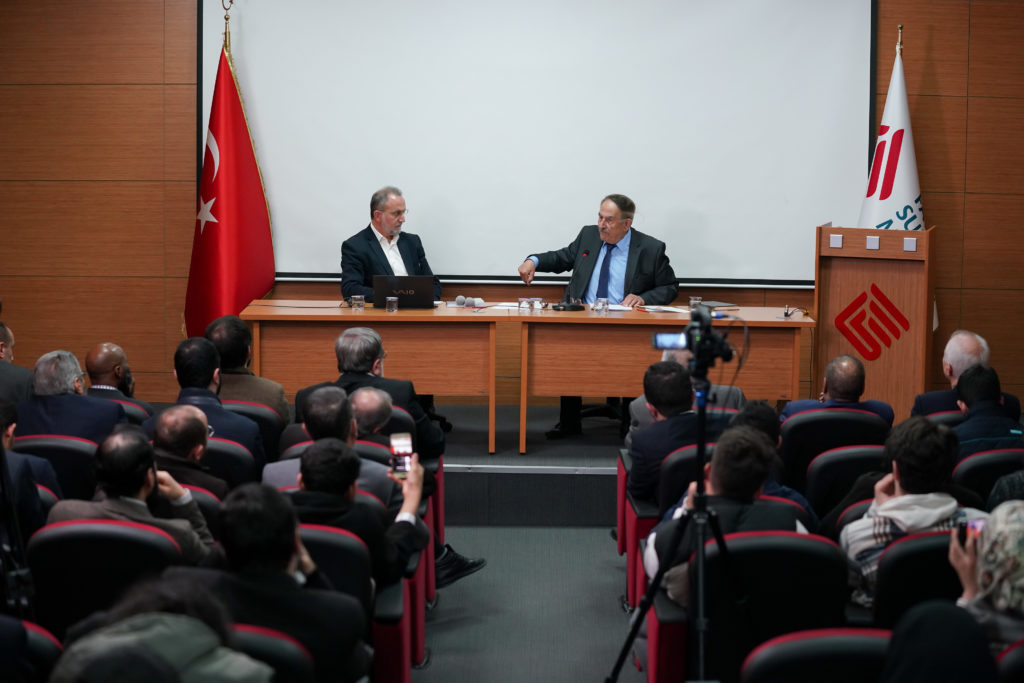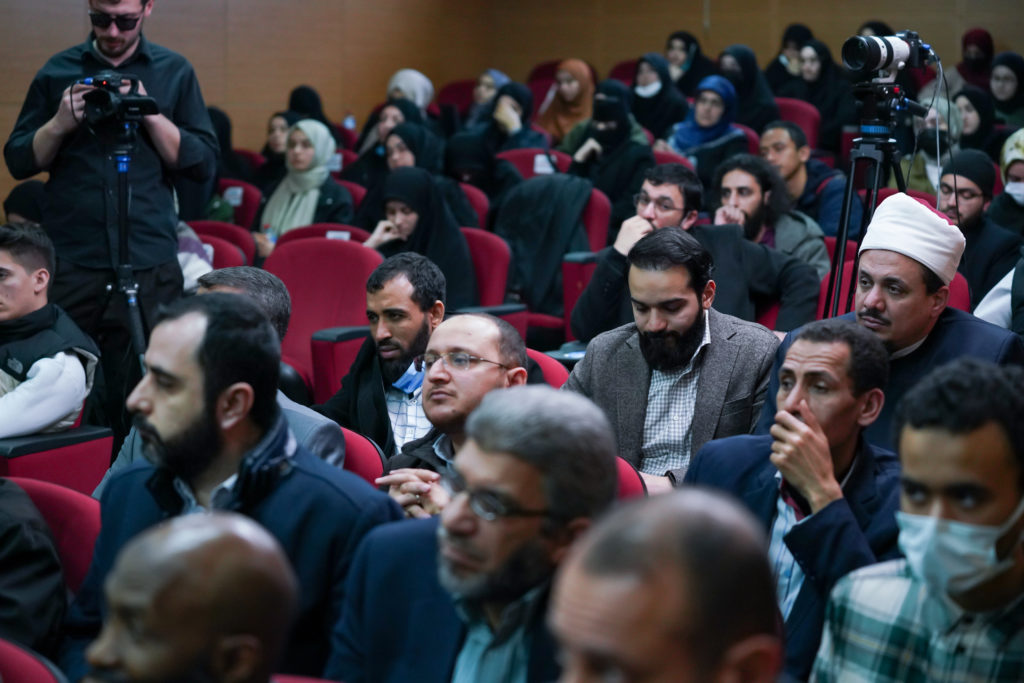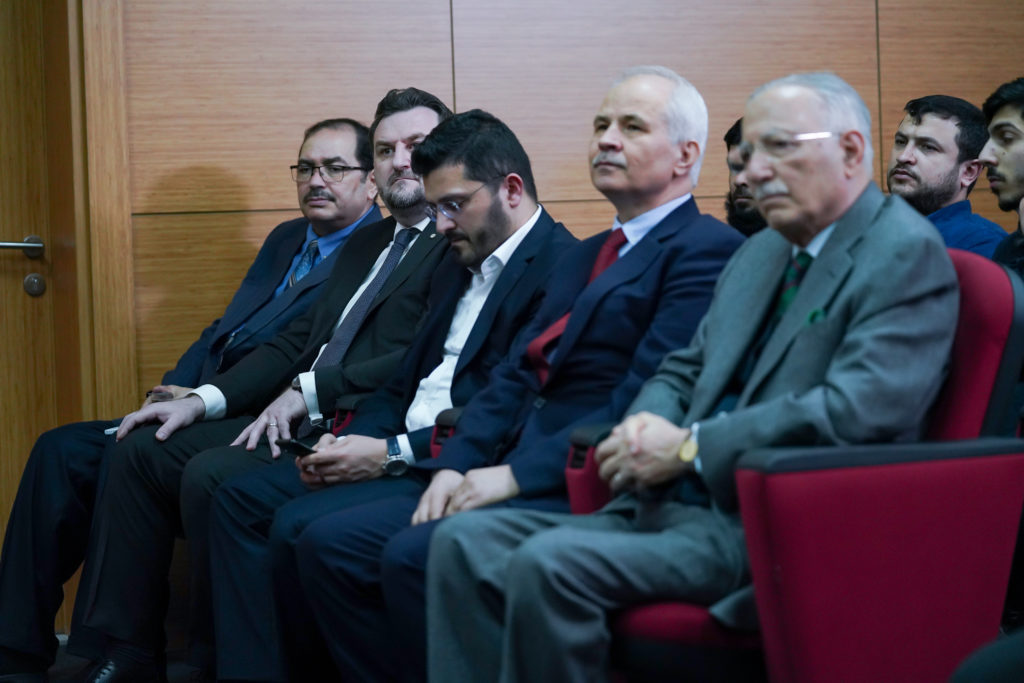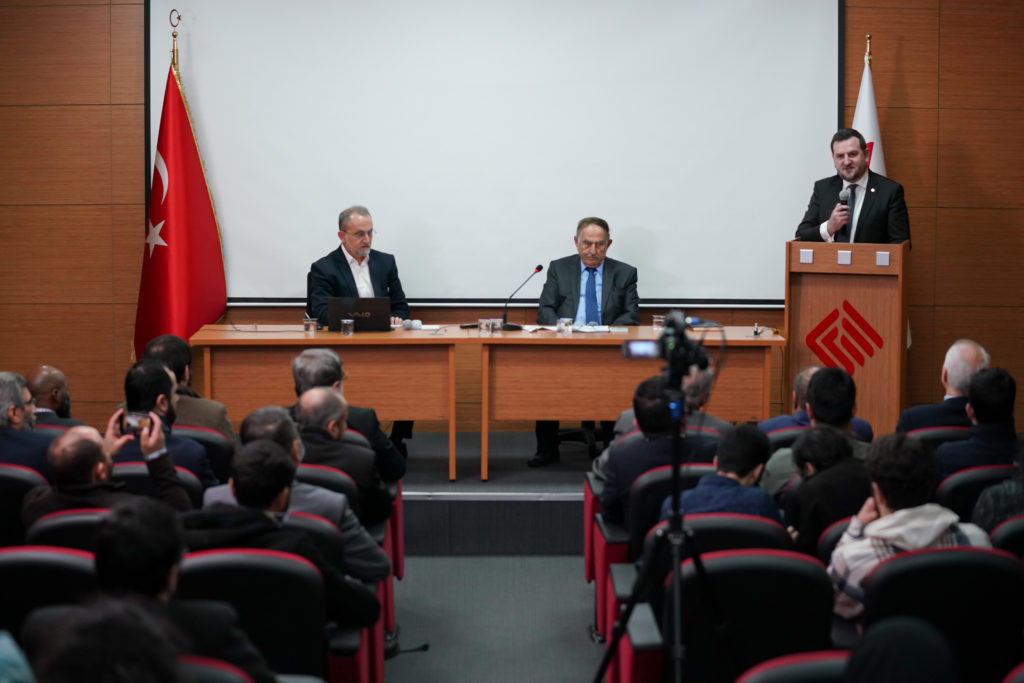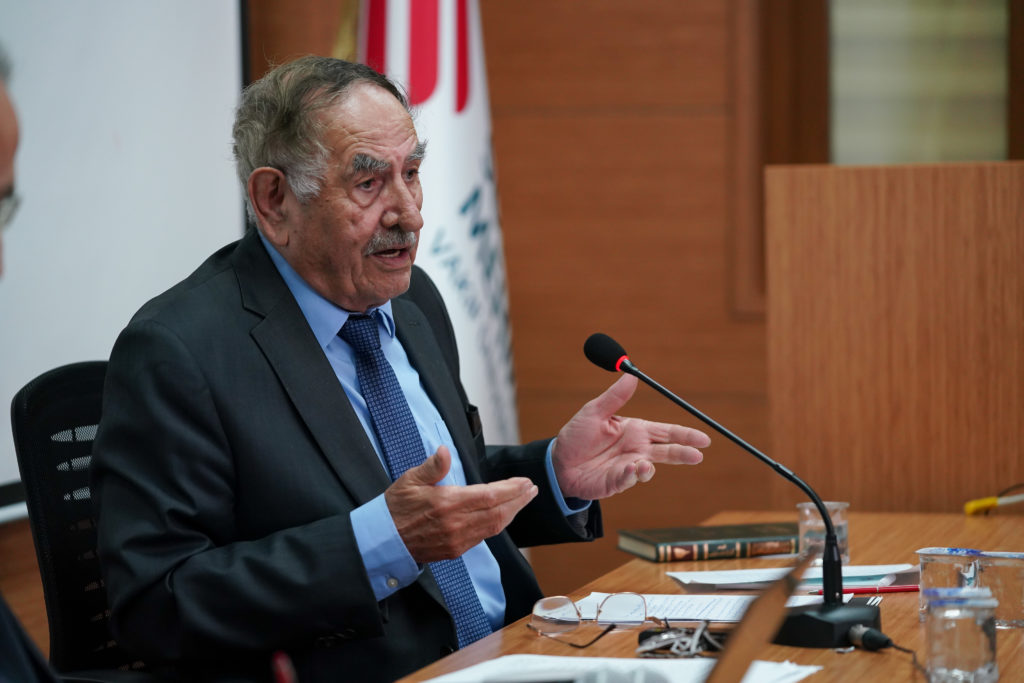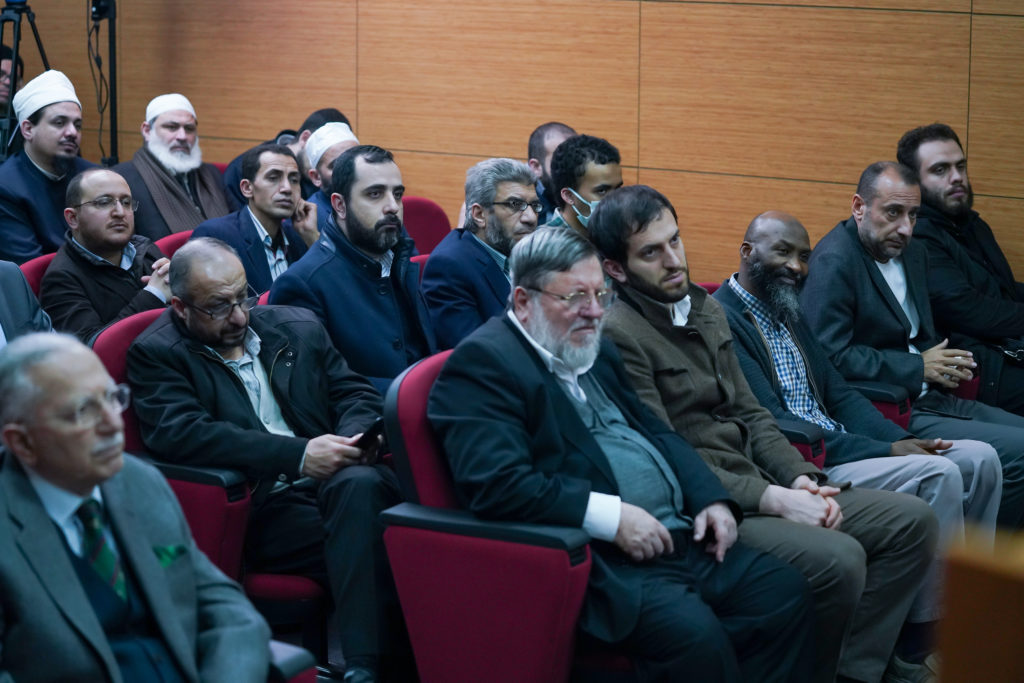Lecture by Professor Bashar Awwad Marouf
The lecture theatre at the Faculty of Islamic Sciences, Fatih Sultan Mehmet Vakıf Üniversitesi in Istanbul was the venue for a public lecture delivered by Professor Bashar Awwad Marouf on Monday, 28 March 2022CE. The lecture, titled “The narrations of Ṣaḥīḥ al-Bukhārī, and their significance in establishing the authenticity of the text and its Prophetic traditions”, was organised by the Centre for Study of Islamic Manuscripts at Al-Furqān Islamic Heritage Foundation, in coordination with the Faculty of Islamic Sciences, Fatih Sultan Mehmet Vakıf Üniversitesi. The proceedings were chaired by Dr Mehmet Fatih Kaya, and attracted a large audience of university professors, students, and researchers.
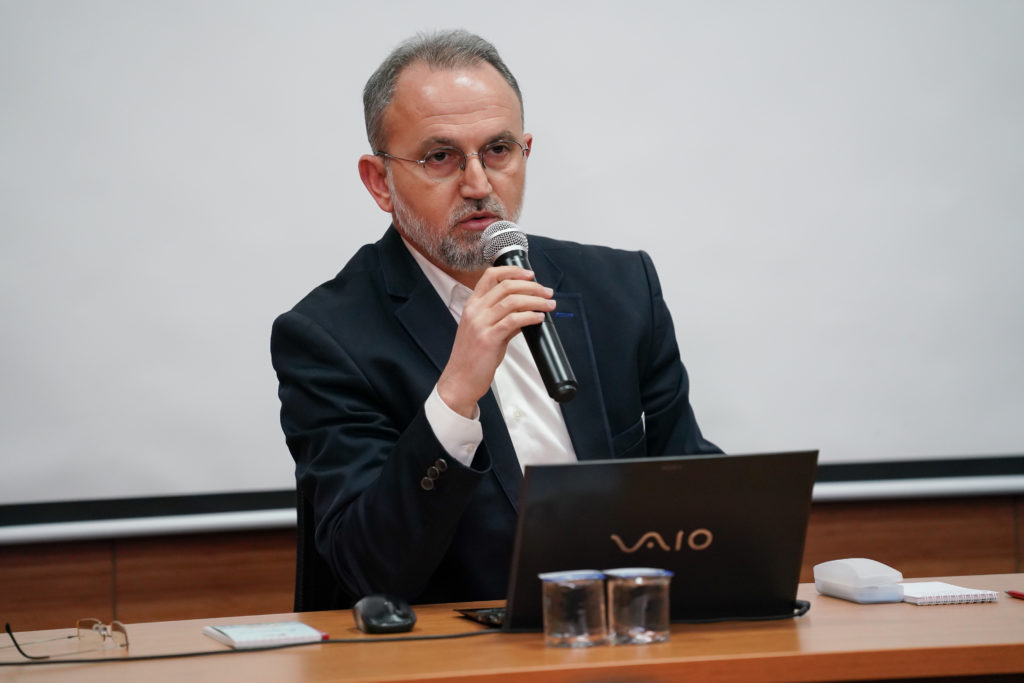
Dr Mehmet Fatih Kaya launched the event with a brief summary of the lecture topic, and the lecturer’s scientific profile. Prof. Dr. Mustafa Altundağ, Dean of the Faculty of Islamic Sciences, Fatih Sultan Mehmet Vakıf Üniversitesi, then welcomed the audience and the lecturer, Professor Bashar Awwad Marouf, referring to him as an exceptional, grand scientific personality, and venerable elder of the critical editors of this era. He added that the Faculty, its teachers, and students were all ears to hear this engaging lecture, drawing benefit from the distilled essence of his scientific journey among heritage texts, deep exploration of the Sunnah’s sources and sciences, and the fruit of his experience in the science of narrators (‘ilm al-rijāl).
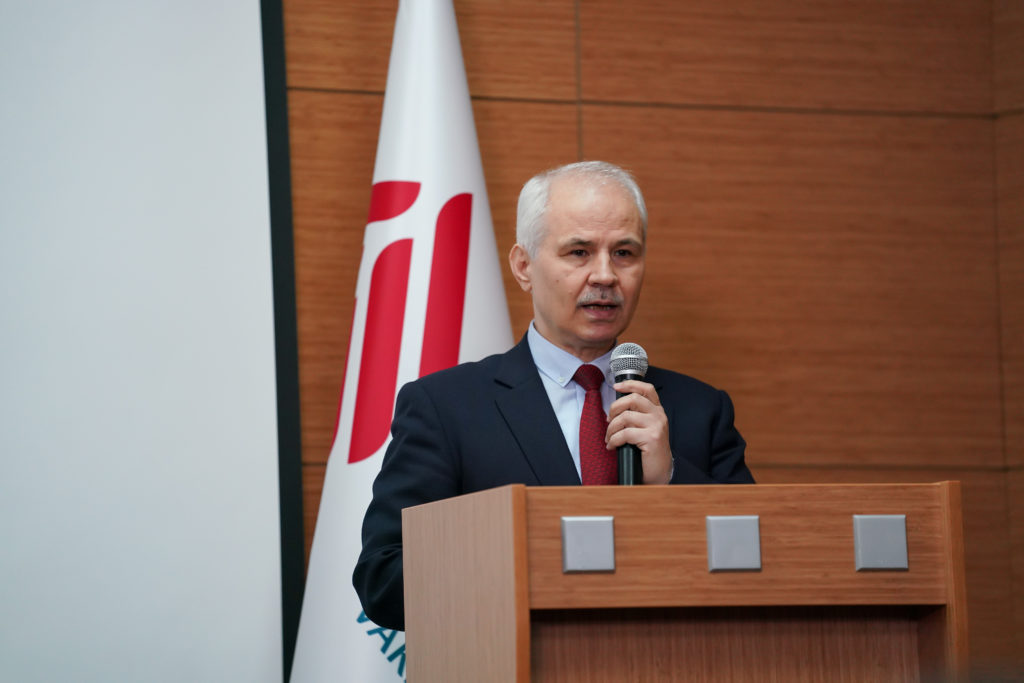
Mr Sali Shahsivari, Managing Director of Al-Furqān Islamic Heritage Foundation then extended a warm welcome to the esteemed audience of scholars and participants, extolling the cooperation with the Faculty of Islamic Sciences, Fatih Sultan Mehmet Vakıf Üniversitesi. He praised the Faculty’s Dean, Prof. Dr. Mustafa Altundağ, for hosting this quite timely, engaging, entertaining, and beneficial lecture on the most authentic book after the Noble Qur’ān, namely al-Jāmi‘ al-Ṣaḥīḥ by al-Bukhārī; a work subject to misrepresentation in recurring rounds of controversy, and insidious campaigns of various guises, whether from our compatriots or Islam’s enemies, taking the approaches of either drying or contaminating the sources.
Mr Sali also thanked everyone, who had assisted in organising this lecture, whether from the Faculty of Islamic Sciences, Fatih Sultan Mehmet Vakıf Üniversitesi, or Al-Furqān Foundation.
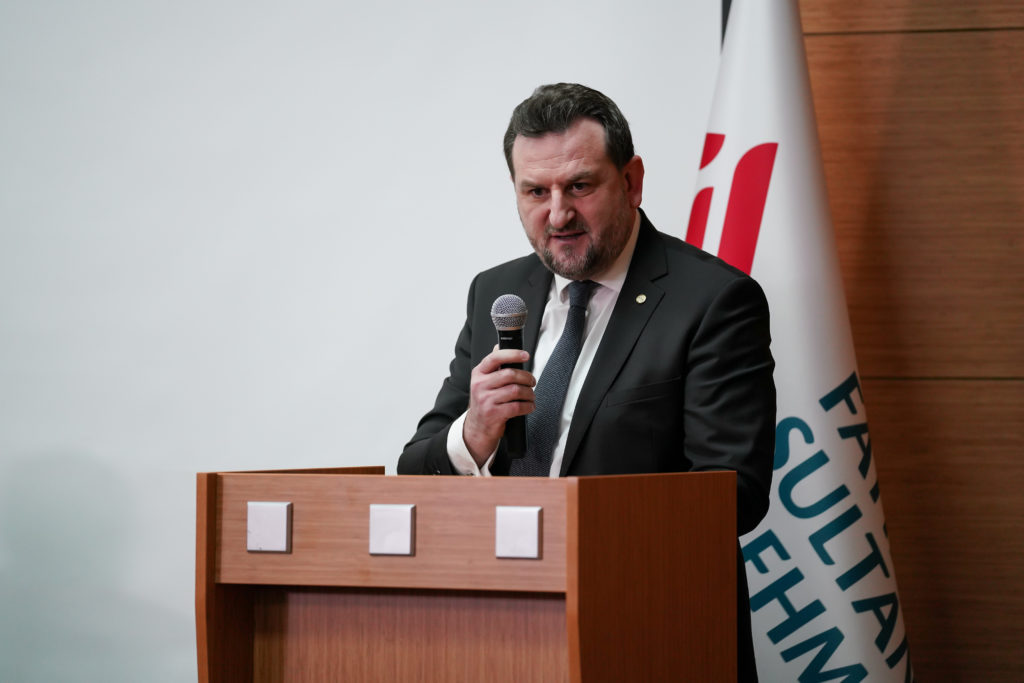
Professor Bashar Awwad Marouf was then invited to speak, where he began his valuable, refined, and rich scholarly lecture by describing the Ṣaḥīḥ’s rank among the books of Prophetic traditions (ḥadīth). He noted that that Ṣaḥīḥ al-Bukhārī was one of the fruits of gathering the Prophetic Sunnah, accomplished by the scholars subsequent to the Companions’ (al-ṣaḥābah) generation—may Allāh be pleased with them.
He then addressed the matter of writing the Prophetic traditions, emphasising that writing in the time of the Prophet, peace be upon him, was rare due to the scarcity of writing materials and implements. However, it became prevalent among the Companions’ children and the generation of Companions’ successors (al-tābi‘ūn), renowned or otherwise. Regarding the reported prohibition on writing the traditions in the time of the Prophet, peace be upon him, such as the tradition on the authority of Abū Sa‘īd al-Khudrī: “whoever has written anything from me other than the Qur’ān should erase it”; this was judged defective (ma‘lūl).
The lecturer explained that writing at that time was undertaken in personal capacity; some Companions, may Allāh be pleased with them, like ‘Abd Allāh b. ‘Amru b. al-‘Āṣ and our Master ‘Alī, used to write the traditions. However, the majority of Companions transmitted traditions verbally, based on audition.
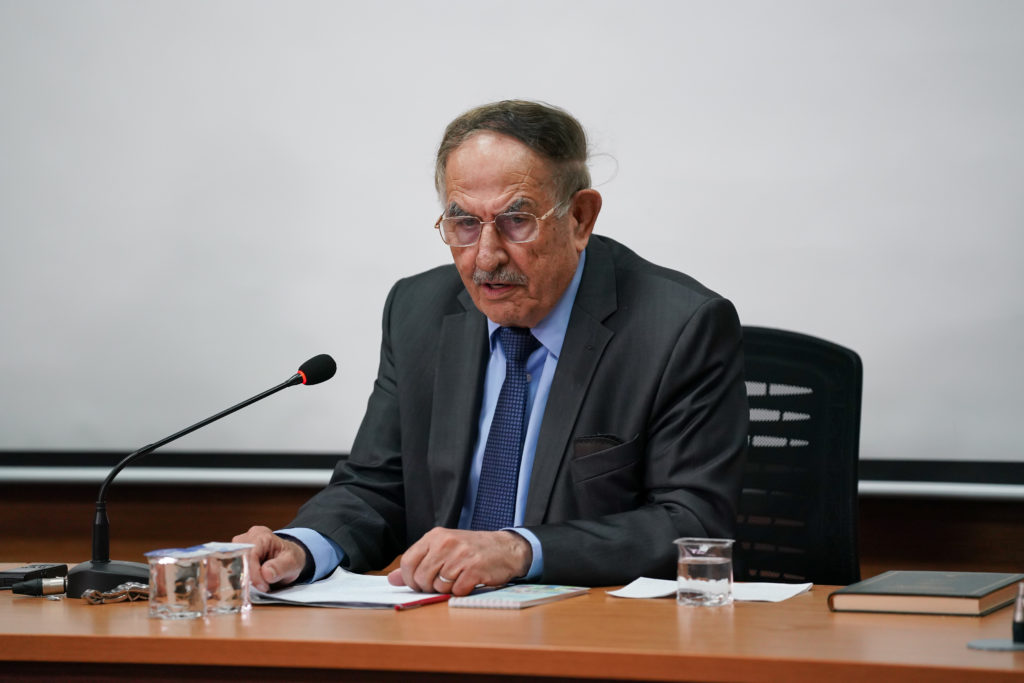
However, traditions were written on papyrus from the time of the Companions’ successors (al-tābi‘ūn) until the era of classification (taṣnīf), which began in the second century. These authored classification works were organised by jurisprudence topics or narrator, etc.
Professor Bashar Awwad Marouf concentrated on the centrality and standing of chains of authority (isnād). He asserted that the greatest product of Islamic intellectual effort were the scientific research methodologies developed by the traditionalists (al-muḥadithūn), namely chains of authority (isnād). These represent a characteristic unique to the Islamic nation, not replicated by any other nation in history.
The lecturer pointed out that Ṣaḥīḥ al-Bukhārī is the first work to compile authentic (ṣaḥīḥ) traditions, organising them into chapters by jurisprudence (fiqh) topic. It differed from other books, as it is a book of Prophetic traditions and jurisprudence at the same time. Through al-Jāmī‘ al-Šaḥīḥ, al-Bukhārī presented Islam on a gold plate; indeed, Islam comprises three principal axes, namely faith (‘aqīdah), ritual worship (‘ibādah), and way of life or behaviour (sulūk). Al-Bukhārī had comprehended the meanings inherent in the approach of the Qur’ān’s opening chapter, Ṣūrat al-Fātiḥah, or ‘Mother of the Book (Um al-kitāb)’, and inclusively structured his book around on them; he started with faith, placed ritual worship in the middle, and concluded with behaviour.
Dr Bashar then began to elucidate the main narrations of al-Jāmī‘ al-ṣaḥīḥ, emphasising that the traditions presented by al-Bukhārī in his compilation were of two kinds. There were traditions mentioned with complete chain of authorities, i.e. authoritative (musnadah), and others where al-Bukhārī did not complete the chain of authorities are deemed hanging (mu‘allaqah). However, the book’s foundation were the authoritative musnadah traditions. Those traditions where he did not complete the chain of authorities are also of two kinds; those which he truncated the chain at the place where cited, but then presented them with full chain of authorities in another; these are considered authoritative. However, another kind which he only presented with truncated chain of authorities, and these are not to be counted against al-Bukhārī, as he had not qualified these following the approaches of tradition authentication. Therefore, as we peruse al-Bukhārī’s al-Jāmī‘ al-Šaḥīḥ, we should hold him accountable only for those traditions that he presented with full chain of authorities. This is because he may sometimes present traditions to illustrate aspects of differences among them; the reason being to explain the issue of abrogation (al-naskh), and that this is the final approved act, while the other is the initial act.
Regarding al-Bukhārī’s methodology for selecting traditions, he would sometimes present the valid traditions of those narrators that were criticised as being unreliable (ḍa‘īf). However, we will always find in Ṣaḥīḥ al-Bukhārī an authentic tradition that is reported by another narrator designated as reliable (thiqah) through a different reliable chain of authorities. Hence, if we were to exclude the unreliable narrator, the tradition remains authentic by way of other chains of authorities. He presented many examples, including the narrations of al-Bukhārī’s teacher, Ismā‘īl b. Abū Uways.
The lecturer then turned to the importance of multiple editions that reveal the final narrations of al-Jāmī‘ al-Šaḥīḥ. He emphasised that the most valid narration is that of the reliable traditionalist, and erudite scholar, Muḥammad b. Yūsuf al-Farabrī, who heard from al-Bukhārī directly, and read al-Jāmī‘ al-Šaḥīḥ to him on three occasions.
The lecturer also addressed the topic of Abū Dharr al-Harawī’s narration and the Yūnīnī copy. He concluded his lecture by stating that the most correct print of al-Ṣaḥīḥ al-Bukhārī to date is the edition printed on the order of Sultan Abdul Hamid II in the early 14th Hijri Century; since then, 130 years have passed without a superior edition being published.
The opportunity to comment and engage in extensive and in-depth discussion was given, with important questions posed on the topics raised in the lecture.
Professor Bashar Awwad Marouf was remarkable in his valuable and engaging lecture, grounded on deep and comprehensive experience, spanning over half a century, in the science of Prophetic tradition and science of narrators. The audience benefited greatly from this novel lecture, and the subsequent discussions, which provided fresh, useful perspectives, as the lecturer demonstrated his typical good practices and acclaimed approaches in the science of Prophetic traditions.
Related Video:


